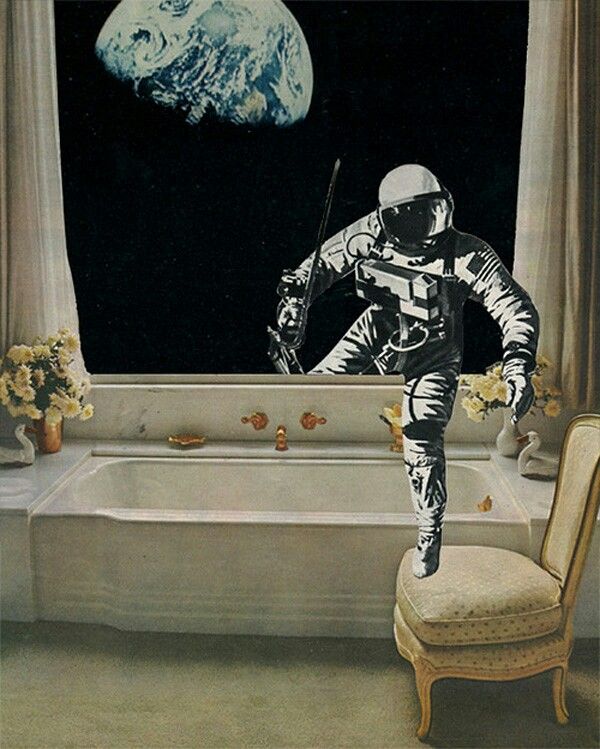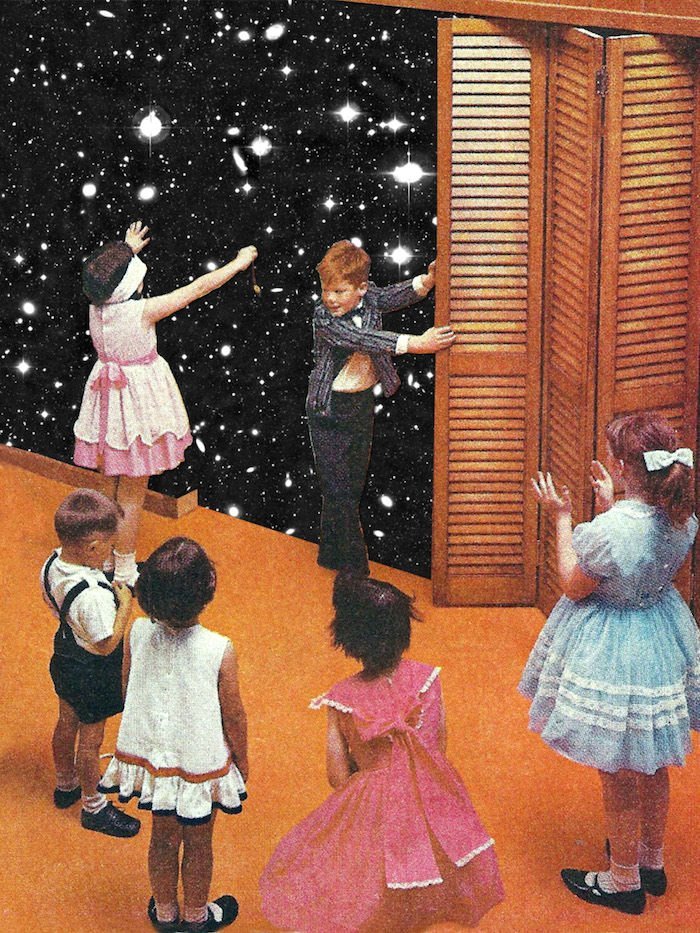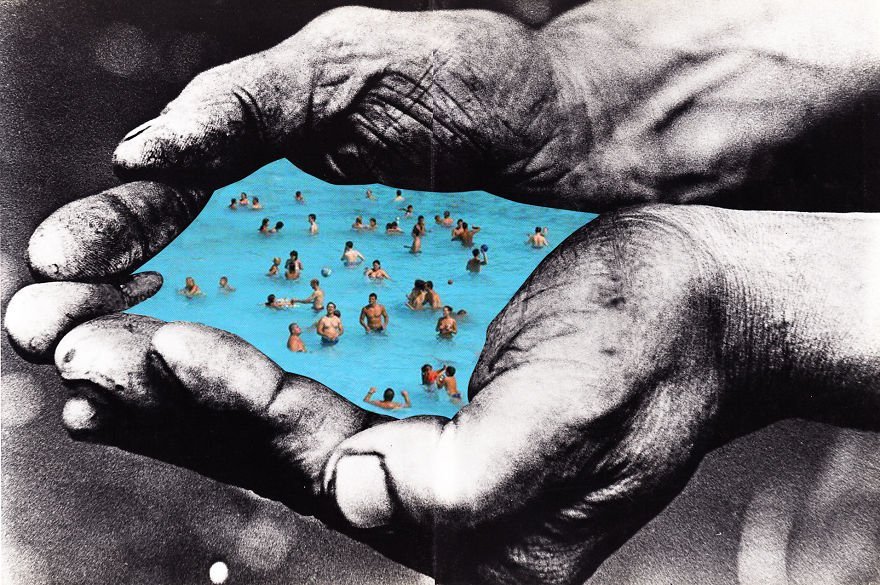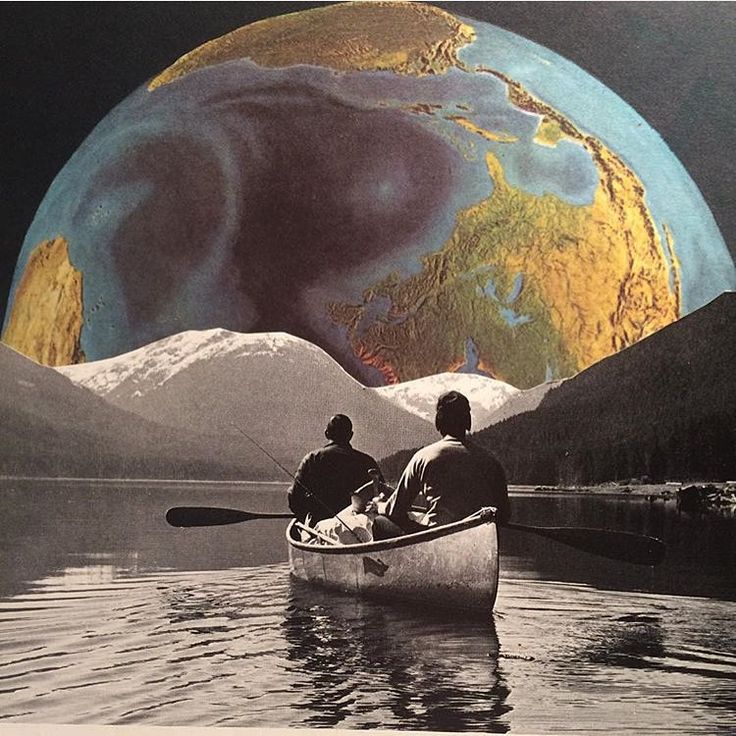Rub-A-Dub-Dub, Three Sinners in a Tub | The Meat, the Milk & Saint Peter’s Brother (Flat Earth & the House It Darkened)

MRS. HADLEY AND THE KIDS WERE ALREADY IN BED for the night, so we stripped down of everything but our bathing suites and yielded to the potency of a bubbling cauldron. I was almost immediately pressed to a conversation among strangers that I’d hoped to retreat from and which they likely wouldn’t be letting their families in on—once returning home to Melbourne. But I was terrible at hiding. The Ozzies had found me out and learned what I did for a living. My attempt at steering them away from my research into Flat Earth towards an intimate knowledge of Jesus was not a success. And so in the Salinas Valley, halfway between Monterey and Santa Cruz, the glimmering of gold within the embankment of a rolling mist—which seemed to materialize whenever high beams danced sporadically among lanes of eucalyptus—gave way to devilish delight, intellectual grinning, and the stench of gratifying self-flagellation.
It is a conversation—like many others held across North America—which still haunts me. They needed to know they were sinners in desperate need of Jesus, and all they wanted to do was meet a Flat Earthist while on Sabbatical so that they might poke sticks through the firmament of His power. And worse, they had made the connection between a cosmological artifact exhumed from antiquity with the superstitious shibboleth of dusty hymnbooks and stained-glass windows. The first gave way to an interconnected rejection of the other. They were toothless babes requiring the milk of Jesus before they could chew on the spiritual meat of the creation which is revealed in His Word. And I made the mistake of spoon-feeding it to them in reverse order.

2
FLIES MIGHT AS WELL HAVE EATEN GORDON’S EYES while we spoke under the shadows of grand oak and the sun-splashed Spanish moss which hung from their intertwined avenue of branches. My neighbor was dying, but he never let anyone in on it. He seemed healthy enough. Yet according to his own testimony he was already dead inside—this much I was certain of. I have never spoken about Gordon before. But now that we’re back in our adopted hometown of Charleston, South Carolina, having traveled across the United States and Canada for years in our fifth-wheel—a journey which first began from Long Beach, California—I think about him more often than not. Gordon was a sweet old man. And though he wore the kindred spirit of a southern gentleman, his true identity was no different than the back porch majority of sinful humanity. Gordon was a dead man walking.
The old rice plantation where I first met Gordon is a mostly-forgotten, happily overlooked microcosm of American culture populated of oaks, cypress trees, bald eagles, owls, fireflies, and an endless parade of alligators. The Native Americans once named this place Yeshoe, meaning: “Green Water.” The nearby overpass, which replaced the tired coach and buggy bridge, and the train which still whistles through the night from beyond the pale moonlit trees beyond our bedroom windows, both served as vital supply routes for the doomed Confederacy. Here among the bayou, starving adolescents and shoe-less old men in gray uniform once fled the ashes of Atlanta for shelter, and with Sherman’s final northward march from Savannah, they attempted one of their final stands. My neighbor appreciated history as much as I. We talked about the land I’ve come to love—and more.
But if I gaze back at Gordon and sorrowfully shake my head, it’s because I recall my meaty pronunciations which sought to dominate our conversations. I had only just discovered the truth of Flat Earth. This awakening was an intimate one, but only because it enhanced the joy of my salvation. It was what I likened to a pre-wedding present from the bridegroom. I finally understood what Satan meant when he offered Jesus the kingdoms of this world if He bowed and worshiped him—and Jesus also, when declaring He was not of this world. It changed everything for me. The straight and narrow suddenly became straighter and narrower. But even more harrowing than my pilgrim’s journey to the Celestial City—in John Bunyan terms—a thorough retrospective of my own life inquired if I’d even departed from the City of Destruction to begin with, as I once thought. Conclusively, Flat Earth is a second chance; a joyous journey of discovery which I desperately desired for others—and still do. Yet whenever Gordon comes to mind, I recollect my insistence that we currently stood upon a flat, stationary Earth—just as the Bible declares—and wince.

I was contending that he meet the Creator in a reverse order. Gordon wasn’t even a babe in Christ yet. A babe in Christ does not have the teeth to chew and digest a spiritual meat. Before they can mature beyond the squashed vegetables which adorn the bib—before they can let go of the coffee table and hobble across the rug—before they can pull up their big boy pants—they must be held to the breast and nurtured. Gordon wasn’t even born again yet. There were of course the moments between our conversations when the Lord prompted me to put my fascinations aside and speak truth with Gordon. No, He didn’t want me to prove the old rice plantation surrounding us was inhabited by flat—albeit green—water. Gordon needed to hear about Jesus. He needed to dip his hands in the cool life giving water and refresh his lips. Gordon needed the only truth which would cause him to thirst no more.
He needed the milk which Paul wrote about in 1 Corinthians 3:1-3, and which very few Christians can apparently ween off of:
“And I, brethren, could not speak unto you as unto spiritual, but as unto carnal, even as unto babes in Christ. I have fed you with milk, and not with meat: for hitherto ye were not able to bear it, neither yet now are ye able. For ye are yet carnal: for whereas there is among you envying, and strife, and divisions, are ye not carnal, and walk as men?”
There is a clear defining difference between the Creator and his conspiracy-plagued creation, despite the fact that I’d convinced myself otherwise. Truth be known, I was only interested in throwing a precious soul down the rabbit hole of humanism and perverse inquiry in hopes that he’d come out alright in the end. I wanted Gordon to inhabit my very Wonderland of the conspirator, a realm populated of roaming goats—an unseen crumb on the map with no x marks the spot or delivery address for the inquirer—where its endless abstractions may be found among the naked mannequins, dusty boxes, and blanketed display cases one floor above the department stores highest advertised elevator button. For the conspirator, it is the crowning virtue of his existence, a dimly-lit rectitude of breaker boxes and cobwebs which often leads to a worse condition of cognition than the multitudes of sheep he gawks at roaming the city streets below him. I was only interested in leading Gordon towards a Flat Earth movement which is populated by wolves, with hirelings for shepherds. I was enlisting him as a malnourished sheep and insuring that he’d be ripped to pieces.
Truly, I cringe.
One afternoon I recall Gordon was on my mind, and for once the prerogative to creation was clear. He needed an introduction to its Creator. With the squeaks and the clamber of my sons little red tricycles following uncomfortable close to my heels, and having already discredited the aptitude of my mind, I walked towards Gordon’s porch, wiped the sweat from my brow, loosened the top buttoned of my shirt, and gulped.

3
ANDREW MUST HAVE FELT LIKE A STRANGER in a very strange land. So the giddy-up to his gut only felt like a natural knee-jerk reaction when the Baptist declared from the banks of the Jordan, “Behold, the Lamb of God!” The person approaching was exactly the sort of stranger he was looking for.
The man who had distinct privilege of becoming the very first disciple called upon by Jesus (John 1:35-40)—much like the three Ozzies—had taken a sabbatical. His destination was not a Jacuzzi in the Salinas Valley, but the Jordan River, where the Baptist was preaching a message of repentance in anticipation of the Messiah. We know Andrew as an Apostle, though if we think about him little, it’s likely because his domineering brother came along. Of the four leading disciples, which include his brother Peter and the quarrelsome siblings James and John, Andrew is the least known. When asked, most people wouldn’t even realize the rock which Jesus built His church upon (Matthew 16:18) had a brother, despite the fact that among his nine humble mentions in the New Testament—some of which simply lists him as a member of the group—he is pointedly referred to as “Peter’s brother.” Actually, before Simon was even introduced to the reader, a name which means: “Hot-tempered, volatile, and violent,” John referred to the first disciple as “Simon Peter’s brother.”
His recognized identity, being the lesser half, is a long held tradition. Archaeologists have discovered the house which Andrew and Peter occupied in Capernaum, as first indicated in Mark 1:29, where they operated a fishing business, perhaps in league with Zebedee, the father of James and John (Matthew 4:21). They have only thought to name their discovery “Peter’s house,” perhaps in part because three Gospels record Jesus as having healed Peter’s mother-in-law of a fever there. The message seems clear. Nobody cares to be Andrew. And perhaps just as importantly, nobody wants to stand next to him.
 There is an uncomfortable truth here. Despite the fact that his name will be forever adorned on one of the twelve gates in New Jerusalem, Andrew exemplified a close relationship with Christ which very few care to have. His is most evident in the fact that he was often the means by which others encountered Him. It was Andrew who brought the young boy with the five barley loaves and two small fish to Jesus while the other disciples seemed clueless (John 6:9). Andrew was so thorough at telling others about Jesus, when Greeks sought out the Messiah through Philip (John 12:20-22), Philip corralled Peter’s brother. If Andrew knew how to set up an introduction with the life giver, it’s only because he understood—maybe better than anyone—that Jesus wanted to meet everyone who desired to meet Him (John 6:37).
There is an uncomfortable truth here. Despite the fact that his name will be forever adorned on one of the twelve gates in New Jerusalem, Andrew exemplified a close relationship with Christ which very few care to have. His is most evident in the fact that he was often the means by which others encountered Him. It was Andrew who brought the young boy with the five barley loaves and two small fish to Jesus while the other disciples seemed clueless (John 6:9). Andrew was so thorough at telling others about Jesus, when Greeks sought out the Messiah through Philip (John 12:20-22), Philip corralled Peter’s brother. If Andrew knew how to set up an introduction with the life giver, it’s only because he understood—maybe better than anyone—that Jesus wanted to meet everyone who desired to meet Him (John 6:37).
Knowing full well his brother’s tendency to dominate, Andrew did not hold Peter back from salvation, even though he could have convinced himself otherwise, in hopes that he might have Jesus all to himself, perhaps even rise to a position of coveted applause after His kingdom was ushered in. Peter was so brash he even dominated the twelve disciples. Introducing Peter to the Messiah meant slipping back into the shadows—losing his prime seat at the ministry table—laboring in obscurity. And yet he personally led the rock to Jesus (John 1:41-42). It was his very first recorded action. One thing seems certain, Andrew did not seek to be the center of attention, nor resent those who did. The Bible never once corrects Andrew for his missteps nor thinks to document them. He was slow to speak, careful in what he said, and he is only recording as saying the right thing. The same cannot be said of Peter and John.
In time, Andrew would be martyred like the rest of them. But it wasn’t for stirring the masses against the Science paradigm of his day. We read of no account in Scripture where any Christian was persecuted for befriending contemporaries of other religions in order to challenge the seat of philosophers, all of whom ascribed to a Science falsely so-called, nor beat men over the head with a book inscribing 200 Scripture proofs promising to refute Plato’s globe. He was ultimately crucified in Greece, near Athens, for delivering milk—saving milk. His only crime: leading “one soul” to Christ. Never concerned about those who would overshadow him in this present kingdom or the one to come, nor demanding credit from the stage for his accomplishments, Andrew led the provincial Roman governor’s wife to the Lord.
 Upon learning of her introduction to Jesus through the Apostle, the governor demanded that his first lady recant. But how could she? She had dug up the hidden treasure in the open field (Matthew 13:44) and had found the only reason for living. Digging up further truths recorded in His Word was certain, and would likely enhance the joy of her salvation. Perhaps she may have even been led to denounce Plato’s globe in time. The Bible abounds with unexpected revelations which threaten our everyday experiences, so long as we are willing to cast our self-professed wisdom, religious entanglements, and science falsely so-called aside, and mature—even if it means calling every man a liar in order to agree with the Lord. Naturally, she refused. In turn, Andrew met the same fate as Peter.
Upon learning of her introduction to Jesus through the Apostle, the governor demanded that his first lady recant. But how could she? She had dug up the hidden treasure in the open field (Matthew 13:44) and had found the only reason for living. Digging up further truths recorded in His Word was certain, and would likely enhance the joy of her salvation. Perhaps she may have even been led to denounce Plato’s globe in time. The Bible abounds with unexpected revelations which threaten our everyday experiences, so long as we are willing to cast our self-professed wisdom, religious entanglements, and science falsely so-called aside, and mature—even if it means calling every man a liar in order to agree with the Lord. Naturally, she refused. In turn, Andrew met the same fate as Peter.
“Peter’s brother” was crucified.
I recall reading some time ago how, in the years leading up to the Second World War, archaeologists began to uncover within the hushed halls beneath Saint Peter’s Basilica a necropolis containing the sepulchers of wealthy Roman families dating back to the first and second centuries. The frescoed mausoleums displayed colorful paintings, etchings, and mosaics illustrating the stories of the deceased, but there was one stunning feature which overshadowed the entire lot of them. Early Christian graffiti seemed to focus toward one crypt in particular. In fact, as one moved closer, the otherworldly expression of joy seemed increasingly dramatized by relatives of the deceased for affording the opportunity to bury their loved ones so close to the celebrated Saint. As digging parties finally came upon an adjacent wall to the tropaion, graffiti marked the spot: Petros eni. Or “Peter is within.”
Some people want to be the bride at every wedding and the corpse at every funeral. And where Peter is concerned, even in death others wanted to be buried next to him.

4
THE OLD HOUSE, WITH ITS OVERGROWN GARDEN, sits empty, silent, and secret, hinged together only by the afterthought of darkness. He died while we were away on travel—particularly when I was writing my first Flat Earth book in Canada, Avoid Science Falsely So-Called. Gordon didn’t need to know about the Jesuit plot against Christendom or the Zionist takeover of the world. He didn’t need to know space is fake—how it all began with the Mystery religion, or how the Science deception, having claimed succession from the Occult after the alchemists and Isaac Newton bowed out, is bleeding right back into the genetic strand which created it. He needed the only cure for his disease. He needed Jesus.
And I never even made it so far as to ring his doorbell.
If the Lord did not send another evangelist to his door while I was away seeing the world—that is, after my failing to do so—and Gordon did not wash his garments white in the blood of the lamb, then the Bible is clear on his whereabouts. He’s spending the rest of eternity in hell. It is a bitter truth to swallow. My action—or rather, lack thereof—is nothing short of criminal.
While I was dreaming up the generous possibilities; screeching megaphones, ever-broadening platforms and Pentecost-sized crowds which this Flat Earth movement seemed to promise its chiefest-rankers; and reserving my seat at the after party, once Plato’s globe was finally done away with—Gordon desperately needed Peter’s brother to make an introduction to Jesus. But I was too occupied with being Peter. And quite unlike Andrew, I never saw the potential in Gordon.
If Andrew were here, he might have seen Gordon as the next Peter.
-Noel